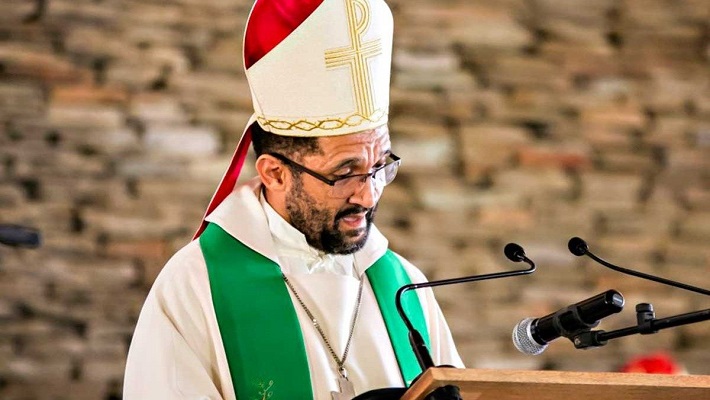MTHATHA, APRIL 4, 2023 (CISA) – Observed on March 13, Rt Rev Sithembele Sipuka, bishop of the Catholic Diocese of Mthatha, South Africa, in his April newsletter reflects on Pope Francis’s 10th anniversary; “on the person that he is, on his leadership and teachings,” and exhorts the faithful to “deduce how God may be talking to us through him.”
“The first thing to note is that Cardinal Bergoglio’s election as Pope is historical because it broke a long history of 1.300 years of having Popes elected among European Cardinals. His homeland is Argentina, which like South Africa, is considered a 3rd world country, so he is “One of us”.
Bishop Sipuka posits the pontiff’s antecedents explain his passionate solidarity with the poor and relentless fight against the injustices they endure.
“His solidarity with the poor also manifests in two of his encyclicals, Laudato Si and Fratelli tutti. In the former, he addresses the injustices of the rich countries resulting from unfair and destructive exploitation of creation. At the same time, in the latter, he laments the economy that disadvantages and excludes 3rd world countries. Most of the countries he visited are poor countries with social and political instability, the recent one being the Democratic Republic of Congo, where he explicitly criticized former colonizing countries for exploiting the resources of poorer countries,” he writes.
Following in the example of Pope Francis, the prelate encourages the people to address injustices at all levels “beginning at a personal level where we strive to act justly and, in the workplace, in the Parish, in the area in which we live, in the province and the country, pursue justice.”
The local ordinary of Mthatha lauds the pope for walking the talk and living in the steps of St. Francis, his chosen pontifical name, whose life of simplicity, curiosity, bravery, kindness and personal charisma continues to guide his pontificate.
“Given how Pope Francis has made simplicity a mark of his life, Bergoglio is teaching us a lot about what our names, given or assumed, invite us to be. The most noted examples of Pope Francis being true to his name were his abandoning of residence in the traditional papal palace, choosing a tiny Fiat car for his local transportation, making the most marginalized a focus of his attention and his concern for environmental justice,” he states.
“African names have a meaning that points towards a virtuous way of life and a mission. As we contemplate Bergoglio made Francis, let us think about our own names and strive to be true to their meaning,” counsels Bishop Sipuka.
The president of the Southern African Catholic Bishops’ Conference (SACBC) says the pope will be remembered for propagating a communal and synodal vision of the Church, which according to him is a revisitation of a vision adopted 60 years ago by the Vatican II council.
“This adopted vision defined the Church as primarily constituted of the people of God by virtue of baptism and secondarily, by various vocations, offices and functions,” he says.
He explains, “in his writings, Pope Francis has begun to adopt an angle of communion and synodality. His angle of writing and teaching emphasizes a personal relationship with Christ rather than focusing too much on structures, reaching out to people in the margins, than focusing too much on rituals and being pastoral and caring rather than heartlessly dishing out ready-made doctrines and laws.”
Bishop Sipuka avers that the pope is presiding over a polarized Church whose reactions “range from a balanced sense of appreciation of what the Pope is doing to a sense of disappointment for not doing enough and to a sense of anger and disgust for allegedly changing the nature of the Church.”
“The way forward in this polarization is to remember that we are people of faith, not just a club gathered by similar ideas and coinciding personality temperaments. We must remember that we are gathered not by our agreement but by common baptism, which invites us to look further than ourselves when differences occur. We must therefore seek together what the will of God is by looking at the tradition of the Church in a Spirit-guided (not political or ideological) way with the openness to modifying our ideas as we listen to each other,” implores Bishop Sipuka.
